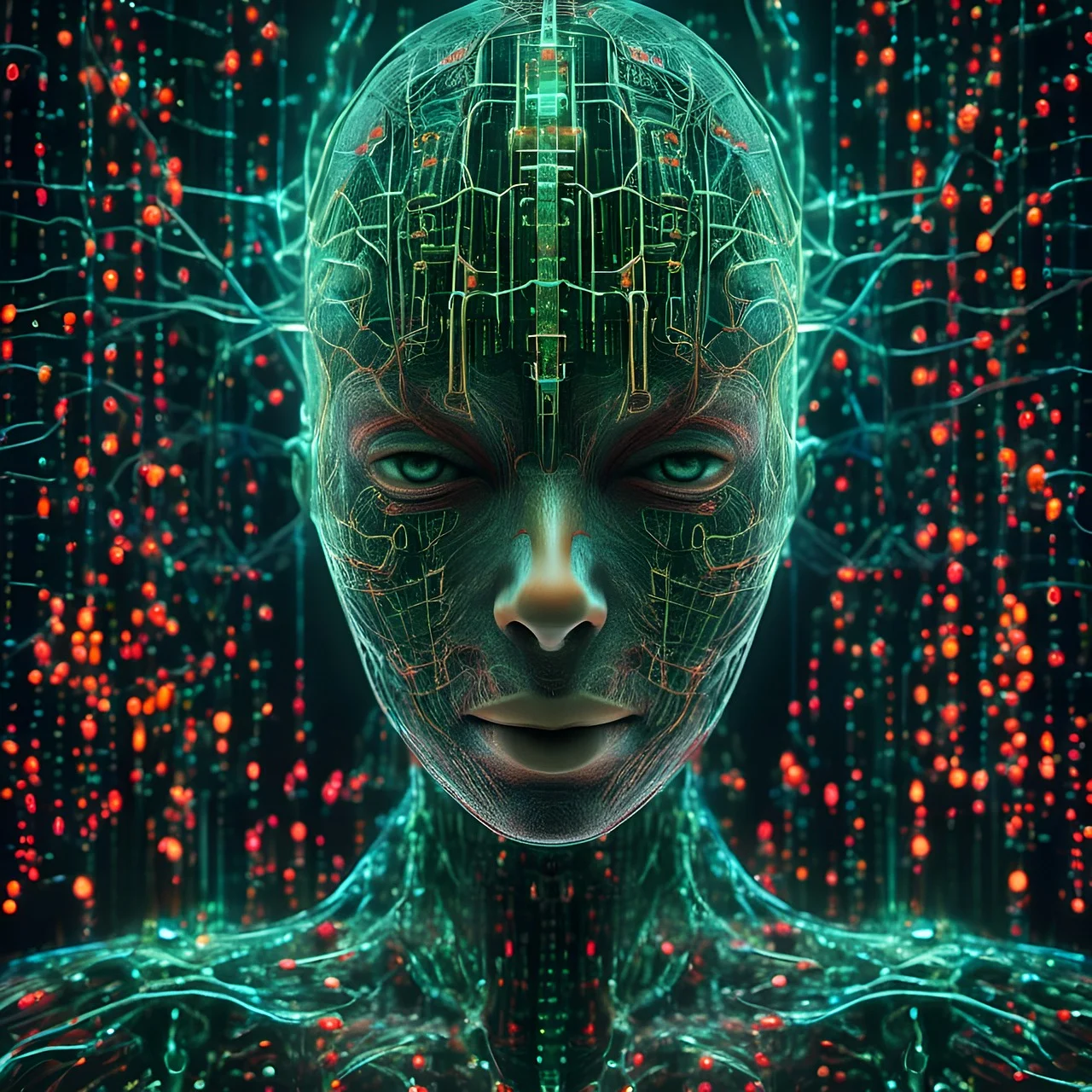The Future of AI:Navigating the Technological Frontier
The future of AI,once a futuristic concept, is now an integral part of our daily lives, and its future promises even more profound transformations.

As we delve into the intricacies of the future of AI, it becomes evident that we are standing at the threshold of a technological frontier that holds immense potential and raises significant chimhallenges.
Emerging Trends in AI Development
The landscape of AI is constantly evolving, driven by breakthroughs in machine learning, natural language processing, and robotics.One of the key trends shaping the future is the move towards more decentralized and edge computing.
This shift allows AI systems to process data closer to the source, reducing latency and enhancing real-time decision-making capabilities.Another noteworthy trend is the convergence of AI with other emerging technologies such as blockchain and the Internet of Things (IoT).
This amalgamation opens up new possibilities for creating intelligent and interconnected systems, fostering a more seamless and efficient digital ecosystem.
Applications Across Industries
The future of AI transcends individual technologies and extends its reach across various industries.In healthcare, AI is poised to revolutionize diagnostics and treatment plans.
AI algorithms can analyze vast datasets to identify patterns and correlations, leading to more accurate and personalized medical interventions.Similarly, in manufacturing and logistics, AI-driven automation is streamlining operations, increasing efficiency, and minimizing errors.
Autonomous vehicles, guided by sophisticated AI systems, are on the verge of transforming the transportation industry, promising safer and more efficient journeys.
Job Market Dynamics
While AI brings about unprecedented advancements, it also raises questions about the impact on the job market.
Automation of routine tasks has the potential to displace certain jobs, leading to concerns about unemployment.However, proponents argue that AI will create new employment opportunities in areas such as AI development, data science, and AI ethics.
Efforts to reskill and upskill the workforce become crucial in adapting to this changing job landscape. Governments, businesses, and educational institutions need to collaborate to ensure that the workforce is adequately prepared for the demands of an AI-driven future.
Ethical Considerations
As AI systems become more sophisticated, ethical considerations become paramount. Issues related to bias in algorithms, privacy concerns, and the potential misuse of AI technology necessitate the development of robust ethical frameworks.

Striking a balance between innovation and ethical responsibility is imperative to build trust in AI systems and ensure their responsible deployment.
The Role of International Cooperative
The global nature of AI development requires international Cooperative and the establishment of common standards.As countries and organizations race to lead in AI research and development, there is a growing need for unified guidelines to address ethical, legal, and technical aspects.
Cooperative efforts can also help prevent a technological divide, ensuring that the benefits of AI are shared globally.
Challenges and Opportunities
The future of AI is not without its challenges. Overcoming technical hurdles, addressing ethical concerns, and navigating regulatory landscapes are formidable tasks.
However, within these challenges lie opportunities for innovation, growth, and positive societal impact.AI is used in various domains and industries to enhance efficiency, automate processes, and facilitate innovation.
Here are some key areas where AI is commonly applied:
1.Healthcare:
-Diagnosis and Treatment:
AI is used for analyzing medical data, assisting in diagnostics, and suggesting personalized treatment plans.
-Drug Discovery:
AI accelerates drug discovery processes by predicting potential drug candidates and analyzing molecular interactions.
2.Finance:
-Algorithmic Trading:
AI algorithms analyze financial data to make real-time trading decisions, optimizing investment strategies.
-Fraud Detection:
AI helps identify unusual patterns and anomalies in financial transactions, improving fraud detection.
3.Manufacturing:
-Robotic Process Automation (RPA):
AI-powered robots automate manufacturing tasks, leading to increased production efficiency and precision.
-Predictive Maintenance:
AI predicts equipment failures, allowing for proactive maintenance and minimizing downtime.
4.Customer Service:
-Chatbots and Virtual Assistants:
AI-driven chatbots provide instant customer support, answering queries and resolving issues.
-Personalized Recommendations:
AI analyzes customer preferences to offer personalized product or content recommendations.
5.Education:
– Adaptive Learning Platforms:
AI is used in educational technology to tailor learning experiences based on individual student progress and needs.
-Automated Grading:
AI algorithms can assist in grading assessments and providing timely feedback.
6.Transportation:
– Autonomous Vehicles:
AI plays a crucial role in the development of self-driving cars and other autonomous vehicles.
-Traffic Management:
AI optimizes traffic flow and reduces congestion through real-time analysis of traffic patterns.
7.Marketing:
-Targeted Advertising:
AI analyzes consumer behavior to deliver personalized and targeted advertising campaigns.
-Customer Segmentation:
AI helps businesses identify and target specific customer segments based on behavior and preferences.
8.Agriculture:
-Precision Farming:
AI assists in optimizing agricultural practices, such as crop monitoring, irrigation management, and yield prediction.
-Disease Detection:
AI algorithms can analyze images to detect diseases in crops.
9.Entertainment:
-Content Recommendation:
AI algorithms analyze user preferences to recommend movies, music, or other content.
-Game Development:
AI is used to create intelligent and adaptive characters in video games.
10.Cybersecurity:
-Anomaly Detection:
AI identifies unusual patterns in network traffic, helping to detect and prevent cyber threats.
-Behavioral Analysis:
AI analyzes user behavior to identify potentially malicious activities.These examples illustrate the diverse applications of AI across industries, showcasing its transformative impact on various aspects of our lives.
Certainly, let’s explore the benefits and drawbacks of AI:
Benefits of AI:
1.Efficiency and Automation:
AI enables automation of repetitive tasks, leading to increased efficiency and productivity in various industries.
2.Data Analysis and Insights:
AI’s ability to analyze large datasets allows for valuable insights and patterns, aiding in informed decision-making.
3.Medical Advancements:
In healthcare, AI contributes to improved diagnostics, personalized treatment plans, and drug discovery, ultimately enhancing patient care.
4.Enhanced User Experiences:
AI-powered technologies, such as virtual assistants and recommendation systems, provide personalized and seamless user experiences.
5.Innovation and Research:
AI accelerates scientific research by processing vast amounts of data, contributing to discoveries and advancements in various fields.
6.Increased Safety:
AI is employed in autonomous vehicles and surveillance systems, enhancing safety through real-time monitoring and decision-making.
7.Cost Savings:
Automation and efficiency improvements driven by AI can lead to cost savings for businesses in terms of time and resources.
8.Personalized Learning:
In education, AI facilitates personalized learning experiences, adapting to individual student needs and optimizing educational outcomes.
Drawbacks of AI:
1.Job Displacement:
The automation of certain tasks by AI can lead to job displacement in certain industries, raising concerns about unemployment.
2.Bias in Algorithms:
AI systems can inadvertently inherit biases present in training data, leading to biased outcomes and discriminatory practices.
3.Privacy Concerns:
The extensive use of AI in data analysis raises privacy concerns, as personal information may be collected and used without adequate safeguards.
The ethical implications of AI, such as decision-making in critical situations and the potential misuse of AI technology, pose significant challenges.
5.Dependency and Reliability:
Overreliance on AI systems may create dependency issues, and the reliability of AI algorithms needs to be ensured for critical applications.
6.Initial Costs and Accessibility:
Implementing AI technologies can involve significant initial costs, and accessibility may be limited, creating a technological divide.
7.Lack of Emotional Intelligence:
Despite advancements, AI lacks emotional intelligence, making it challenging to comprehend and respond appropriately to complex human emotions.
8.Security Risks:
AI systems are susceptible to hacking and manipulation, posing security risks that need to be addressed to prevent unauthorized access and misuse.
In navigating the integration of AI into our societies, it becomes crucial to harness its benefits while proactively addressing and mitigating its potential drawbacks.
Responsible development, ethical considerations, and ongoing evaluation are essential for maximizing the positive impact of AI while minimizing its risks.
The Future of AI:
Unveiling Tomorrow’s Technological Landscape

Artificial Intelligence (AI) is poised to redefine the contours of our technological future. As we stand on the cusp of a new era, the rapid advancements in AI technology promise to revolutionize industries, reshape economies, and influence every facet of our daily lives.
What does the future hold for AI?
The trajectory of AI development suggests a multitude of possibilities.From enhanced automation in industries to the evolution of intelligent personal assistants, the future is brimming with potential.
The integration of AI into healthcare systems could lead to more accurate diagnostics and personalized treatment plans, significantly improving patient outcomes.
How will AI impact the job market?
While AI brings unparalleled efficiency, there is a growing concern about its impact on employment. Routine tasks may become automated, leading to job displacement in certain sectors.
However, the rise of AI also opens new avenues for jobs in AI development, ethical AI governance, and human-AI collaboration, emphasizing the need for upskilling in the workforce.
What about ethical considerations in AI?
As AI becomes increasingly sophisticated, ethical concerns come to the forefront.Ensuring responsible AI development and deployment is crucial to prevent biases, privacy infringements, and unintended consequences.
Striking a balance between innovation and ethical considerations is imperative to harness the full potential of AI for societal benefit.
Can AI lead to breakthroughs in scientific research?
Absolutely. AI is becoming an invaluable tool in scientific endeavors, aiding researchers in data analysis, pattern recognition, and simulation.
The ability of AI to process vast amounts of data at unprecedented speeds opens up new avenues for scientific discoveries, from drug development to climate modeling.
How will AI influence education?
AI has the potential to revolutionize education by personalizing learning experiences.Adaptive learning platforms powered by AI can cater to individual student needs, offering tailored content and feedback.
AI can also assist educators in administrative tasks, enabling them to focus more on interactive and personalized teaching methods.
What challenges lie ahead for AI?
Despite its promising trajectory,AI faces challenges that need careful consideration.Addressing issues related to transparency, accountability,and bias in AI algorithms is crucial.
Additionally, establishing international standards for AI development and ensuring global collaboration will be essential to navigate the complexities of this evolving technological landscape.
Conclusion
In conclusion, the future of AI is a complex tapestry woven with threads of innovation, challenges, and ethical considerations.As we venture into this technological frontier, it is crucial to approach AI development with a holistic perspective, focusing not only on technological advancements but also on the societal, ethical, and economic implications.Only through thoughtful and responsible stewardship can we unlock the full potential of AI for the benefit of humanity.
In conclusion, the future of AI is a dynamic canvas, painted with the brushstrokes of innovation and ethical responsibility.As we navigate this transformative journey, asking the right questions and finding thoughtful answers will be key to unlocking the full potential of AI for the betterment of humanity.
Why Technology is Good: Unveiling the Multifaceted Benefits in the Modern Era.





